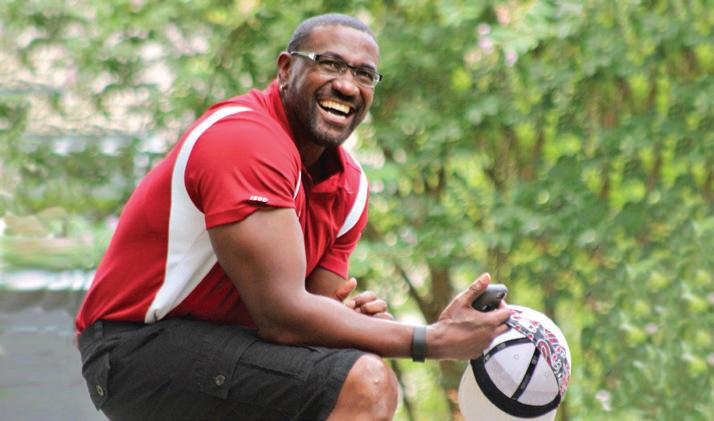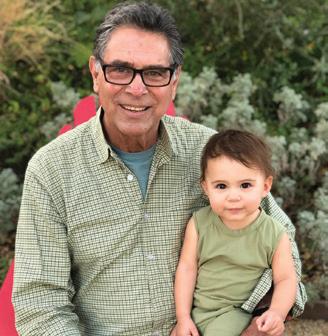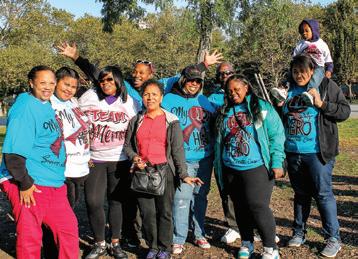
3 minute read
Empowering ALL Myeloma Patients
The International Myeloma Foundation believes that diversity and inclusion are integral aspects of the myeloma community. Explore this pamphlet to learn how you can be empowered.
Know Your Risks

Black men and women are diagnosed with myeloma at approximately twice the rate as the combined average for all racial or ethnic backgrounds, but we do not yet know all the reasons why.
STUDIES SHOW:
There is an increased risk of diagnosis in veterans and first responders who have been exposed to environmental toxins. Black women represent 30% and black men represent 17% of active-duty, enlisted military personnel.

Tiffany, a 5-year myeloma survivor, with her daughter.
Men are more likely to be diagnosed with myeloma than women. The average age of diagnosis is 66 in black men, compared to the average age of 70 in their Caucasian counterparts.
Other causes and triggers of myeloma include: • Exposure to toxic chemicals • Exposure to atomic radiation • Exposure to certain viruses • Genetic predisposition (in approximately 5-7% of all myeloma diagnoses)
Myeloma Knows No Borders
People all over the world and from all different walks of life are diagnosed with myeloma. With this in mind, the International Myeloma Foundation strives to include all people at our events and programs. The members of the myeloma community are diverse not only in gender, race, ethnicity, sexual orientation, disability, religion, and age, but also in cultural backgrounds, life experiences, thoughts, and ideas.
We ask that groups who feel they are underrepresented or misrepresented in the myeloma community give voice to their concerns. We are here to listen.
What Is Multiple Myeloma?
Multiple myeloma is a cancer of the bone marrow plasma cells. It represents about 2% of all new cancer cases in the U.S. More than 30,000 people are diagnosed yearly in the U.S. alone.
The IMF has made significant progress toward developing groundbreaking treatment protocols. These protocols help people live longer and better lives.

Earlier Diagnosis Better Outcomes
As with most cancers, the earlier patients are diagnosed, the better their outcomes. Yet, in more than 95% of patients we do not know the cause. The following are symptoms of myeloma:

We know that disparities exist in the care of myeloma patients according to their various racial and ethnic groups. Yet, not enough research has been done to pinpoint the reasons for and causes of these disparities.
Overcoming Disparities in Care
We encourage you to visit diversity.myeloma.org to learn more.

Fatigue and weakness Bone pain or unexplained fracture(s) Recurring, persistent infections
Here’s the good news: Today, multiple myeloma patients are living longer and more active lives.
Did You Know?

When African-American patients are in clinical trials, they fare as well as white patients. We know that socioeconomic status is associated with overall survival in myeloma patients. Some studies show that stem cell transplants are underutilized as a treatment regimen for Hispanic-American myeloma patients. There is a lack of research regarding the incidence of multiple myeloma in Native American populations. More research must be conducted to further understand how myeloma affects Asian Americans and Hispanic Americans.
Who Gets This Cancer?
The IMF is here to help. We offer in-person education programs and a wide range of print and digital resources for free on our website at myeloma.org.
Our toll-free InfoLine offers guidance in finding a local myeloma specialist, understanding treatment options, side effects, and helping you research financial assistance options, clinical trials, and access to treatment.

Multiple myeloma patients, caregivers, family, and friends gather at an IMF fundraiser.
Join the Conversation
We know more research is needed to understand how and why myeloma affects African Americans the way it does. Under the guidance of our Chief Medical Officer, Dr. Joseph Mikhael, the IMF is committed to pursuing answers to these questions.

Join us at diversity.myeloma.org to sign up for our mailing list. You can be the first to know of any new developments, studies, or programs that may affect you and your loved ones.
Reach Out
818.487.7455 or 800.452.CURE (2873) Infoline@myeloma.org | myeloma.org facebook.com/myeloma @IMFMyeloma @IMFmyeloma
International Myeloma Foundation
12650 Riverside Drive, Suite 206 North Hollywood, CA 91607


